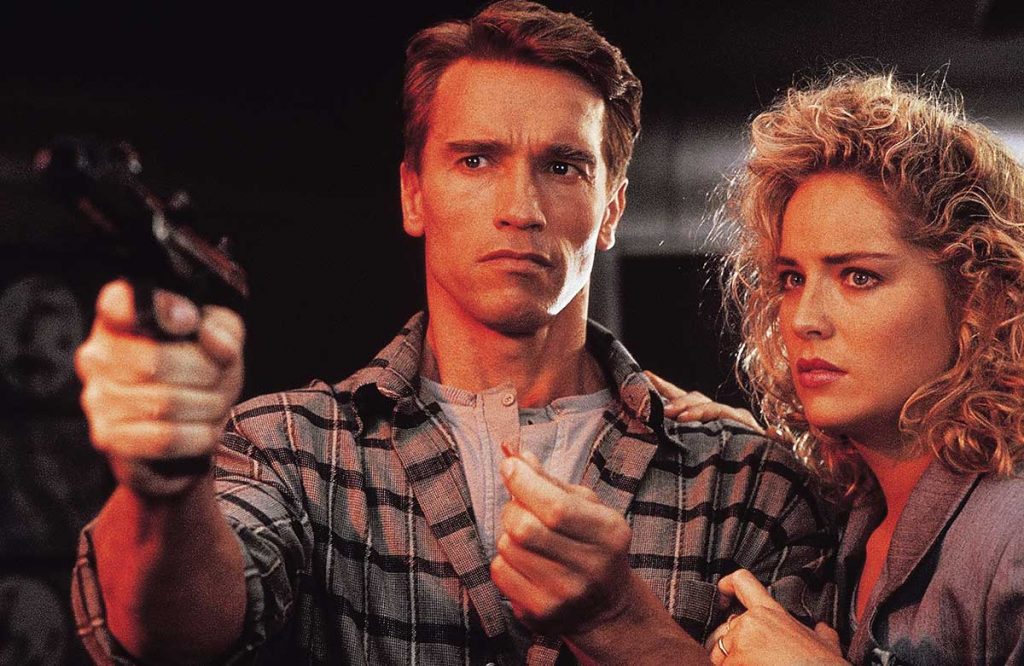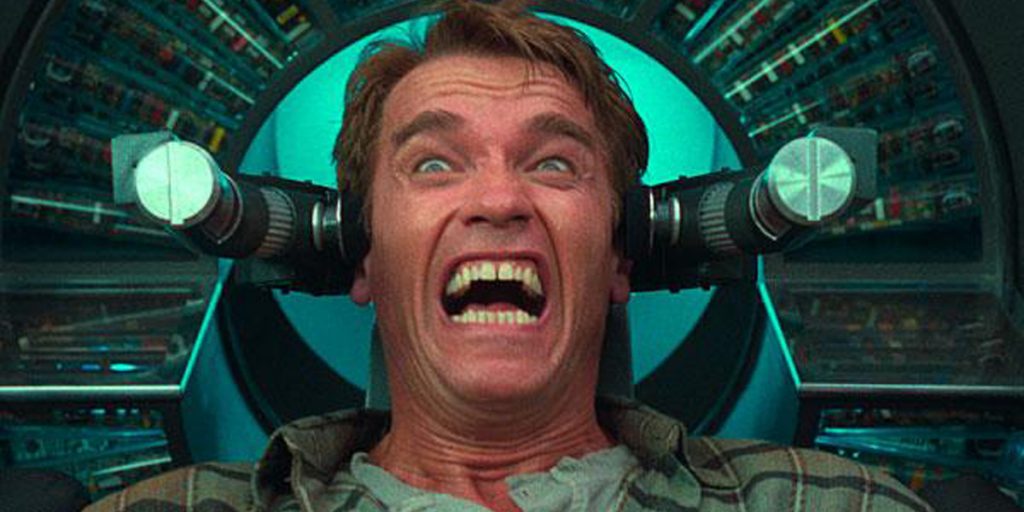Total Recall succeeds where hundreds of its contemporaries fail; a sci-fi epic turning grand philosophical questions into undeniable and ludicrous fun.
The year is 2084, and run-of-the-mill construction worker Douglas Quaid (played by that typical everyman, Arnold Schwarzenegger, of Jingle All the Way) is having recurring dreams about Mars. Unable to get them out of his head, and with his wife Lori (Sharon Stone) reluctant to make the rocket flight, Quaid decides to head to Rekall, a memory implant tourism-substitute agency, who promise him memories as a government-fighting secret agent. However, during the procedure, the implant hits hidden memories of Quaid’s time as an actual secret agent on the actual Mars, and he finds himself hunted by government forces desperate to stop him from remembering a key piece of information from his past, something of vital importance to the anti-colonial Martian rebellion. Quaid somehow has to evade these operatives, get off the planet, link up with the rebels, and get whatever information is in his head out, all while all the forces of Earth desperately attempt to stop him achieving the titular Total Recall. Meanwhile, one key question lingers over Quaid’s journey, like Mars’ fluorescent scarlet sky – how much of this is really happening, and how much is merely an artificial memory?
In short, there’s a fair amount going on at any given time. However, if all this sounds confusing (as it very well should – it’s important to remember that this is a nearly two-hour script extrapolated from a 23-page short story by sci-fi great Philip K. Dick), its pandemonium should serve to demonstrate how impressive it is that Total Recall, for a sci-fi action film from they heyday of the genre, is remarkably coherent and well-constructed. This is no small blessing, as it allows the film to hurtle at a pace that cements it as one of the most viscerally exciting action movies ever created.
Total Recall is adrenaline-inducing, comical, philosophical and idiotic, often all four in a single sequence. Sometimes, a plot twist is thrown out and then revoked a sentence later. Occasionally, a point about the true nature of morality when all memories are interchangeable will be thrown aside for a one-liner about cornflakes. Sharon Stone kicks Schwarzenegger in the groin twice in act one before popping up forty minutes later to round off the comedic rule of three. Total Recall is American blockbuster cinema distilled down to its basest form.

What’s even more remarkable about Total Recall is that its history is the perfect backstory for an all-timer of a Hollywood flop. Total Recall spent a grand total of 14 years in development between the purchase of the rights to Dick’s story and its triumphant unveiling in 1990, bouncing between production houses and never finding its true footing anywhere. Its script went through dozens of revisions and updates, drafts and rewrites, and the names attached at various points in various roles read as a real who’s who of 1980s cinema: Richard Dreyfuss, David Cronenberg, and Patrick Swayze to name but a few. Eventually, it was the commitment of Schwarzenegger that dragged one of the industry’s most infamous scripts into production, and this in itself should raise some red flags; Schwarzenegger took on an outsized level of responsibility, including an enormous cut of the film’s profits, and hand-picked the film’s director, Paul Verhoeven, based on how much he loved RoboCop. A single one of these production roadblocks should have marked the film for failure, and yet it coalesced into something wonderful.
Of course, one of the major reasons that the film took so long to find a willing producer was the astronomical cost associated with doing it correctly – at the time it was produced, Total Recall was among the most expensive films of all time – and so it is a miracle that no noticeable corners were cut. Despite coming right at the introduction of CGI, the film’s visuals place an awful lot more emphasis on practical effects, meaning that the noticeable aging in the quality of the makeup and effects comes across more as graceful maturity than obsolescence (well, except for one sequence in an X-ray scanner – notably, the film’s one concession to CGI). Its little asides to predict consumer technology are in the same realm of unrealistic excitement as Star Trek, again reinforcing the belief that Total Recall only takes itself as seriously as it is absolutely required to. This extends as far as the acting, too: Schwarzenegger is perhaps as competent as he has ever been, while Michael Ironside’s co-antagonist is as delightfully gravelly as the film’s vast polystyrene quarries.
All this is to say that Total Recall is a film that revels in its own contradictions. Schwarzenegger’s Quaid is a relatable everyman that looks like somebody over-inflated Josh Brolin, and panics in naïve confusion while making one-line quips as he rips a man’s arms off. Total Recall includes a wonderfully executed “dropping of the film’s title in the film”, and yet willingly gives itself over to sociological and psychological analysis. It is Blade Runner’s goofy younger brother that grew up listening to glam rock rather than new wave, a film that dances constantly across the ego and the id with gleeful abandon. Its ambiguity surrounding its events – whether or not anything we see in the film past the first five minutes actually happens – is mostly conjured to highlight a secondary, yet much more crucial question: when you’re having this much fun, who really cares?

